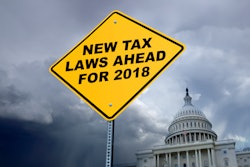
As Tax Day quickly approaches, many warehouse and logistics companies are still scrambling to understand what the recently passed tax reform means for their business.
The Tax Cuts and Jobs Act was signed into effect by President Trump in December, meaning it needs to be taken into account for 2017 financial statements. While the bill was passed at lighting speed, with hand-written notes in the margins, it is all but certain to contain technical glitches, ambiguous sections and unattended consequences.
Representatives of audit, tax and advisory firm Grant Thornton assured a crowd of interested warehouse and logistics professionals at the International Warehouse Logistics Association's (IWLA) annual convention in Tampa Bay on March 11-13, that while the tax bill is not perfect, the opportunities found in the reform will outweigh the risks.
“In a nutshell, the tax reform represents a significant opportunity for transportation and logistics companies,” says David E. Sites, partner, international tax services, Grant Thornton. “With the cuts in the corporate rate and the potential benefits for pass-through organizations…companies need to decide which of these provisions are going to benefit (them) the most and where do (they) have risk with this opportunities. It’s a mixed bag, but mostly benefits with a little bit or risk.”
One of the largest opportunities for the logistics industry lies in expensing. The new tax reform allows businesses to fully expense the cost of business property, including inventory. This provision could have significant impacts on the economy by providing an incentive for companies to spend on maintenance, new equipment and expansion.
“Expensing is a big provision that is going to help people. Maybe they haven’t invested the way they wanted to historically, but you get a full write-off now. It’s very beneficial,” says Russell Norris, senior manager, national transportation and logistics practice leader, Grant Thornton.
Another positive for many logistics professional: the law was aimed at U.S.-based mid-size companies who are focused on creating jobs in America.
“You can see the fingerprints all over this law of its intention to help the mid-size businesses in the heartland of America create jobs, keep more money in their pocket to reinvest in their business and be able to really grow their businesses to be able to compete on a global scale,” Sites explains.
“It’s a tremendous opportunity for mid-size businesses to take advantage of a period that should see really strong growth if the (reforms) work out the way a lot of economics think they will,” he adds.
Like-Kind Exchanges
Not all provisions will have positive effects, however. Norris recommends logistics professionals pay special attention to the like-kind exchange provision, which eliminated exchanges on personal property.
“It’s something a lot of companies have taken advantage of, so that goes away,” he adds.
Like-kind exchanges, otherwise known as section 1031 exchanges, have long encouraged capital reinvestment for individual property owners, small businesses and large corporations. Under Section 1031 of the United States Internal Revenue Code, the exchange of certain types of property may defer the recognition of capital gains or losses due upon sale, and hence defer any capital gains taxes otherwise due.
In a 1031 exchange, an individual or company can trade up older and less-expensive investment properties or equipment for newer, pricier ones. By doing so, they can defer paying capital gains taxes until an eventual sale, allowing investors to reinvest in their businesses.
Tax Planning
No matter how tax reform will impact your businesses, Sites says the key points of the provisions are clear: you have to plan.
“Forget what you knew; the game has changed, especially in the logistics space when it comes to tax planning,” he adds.
The second biggest take away he says is the window of opportunity to act could be small. Individual tax changes expire in two years, with sunrise provisions in place for businesses. As the law is written now, all reforms will revert to their former state by 2025, but Sites says there could be a lot of changes on the horizon subject to how elections play out over the next couple of years.
“The law could be repealed depending on the balances of power in the next election cycle…but the hope is that one party puts something in place permanently,” he adds.
With that uncertainty, tax planning may be more important than ever. Sites notes in this climate it is vital to have a strong advisor who can understand your business and couple that with a strong understanding of the tax law to best position your business.
“When you are looking at business planning, you need to forget what you knew. You have to model out all of the options. You have to have a sophisticated firm who can help you make a sound business decision,” he says. “It’s a new world. Your old strategies are just that—old. You need to think about what your tax strategy is, and you need to go out a get a qualified firm.”
Sites adds: “Companies that are agile and able to change in the face of a changing tax law and adapt themselves to operate most efficiently are going to be the winners, and they’re going to be the ones that have the competitive advantage.”
Follow Amy Wunderlin on Twitter.


















